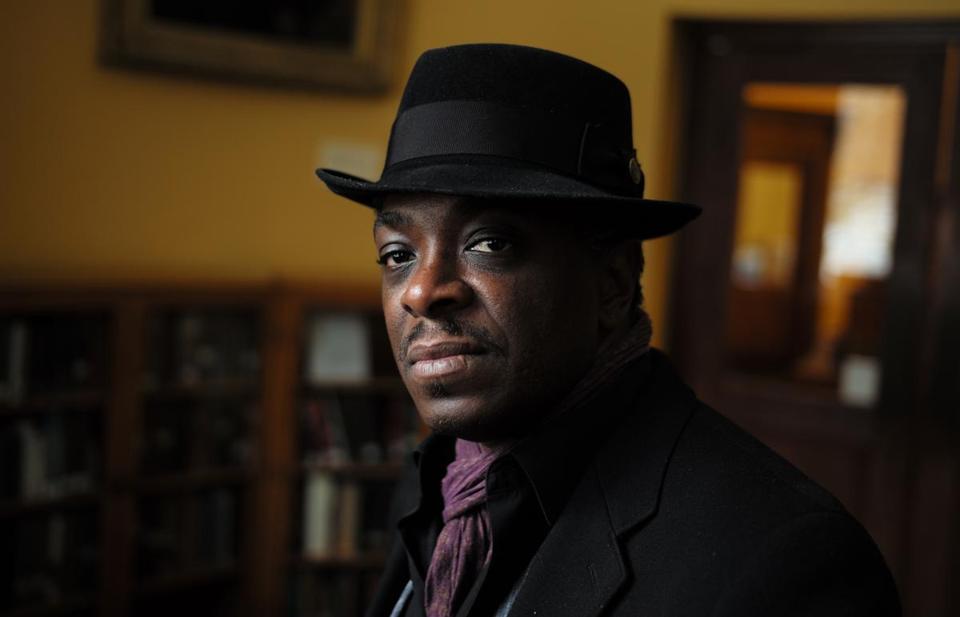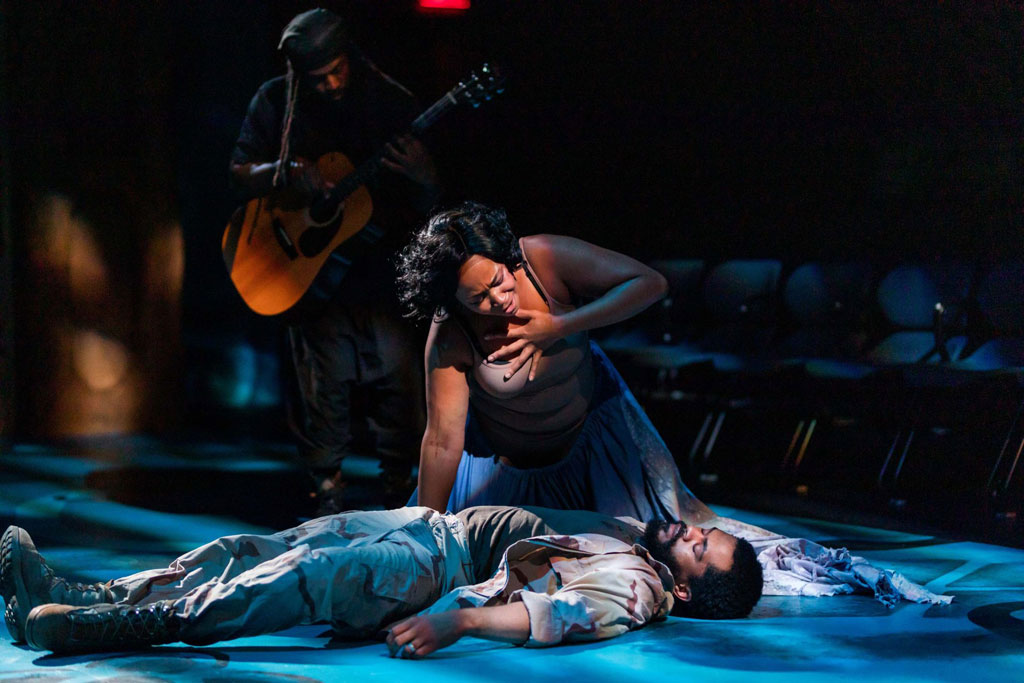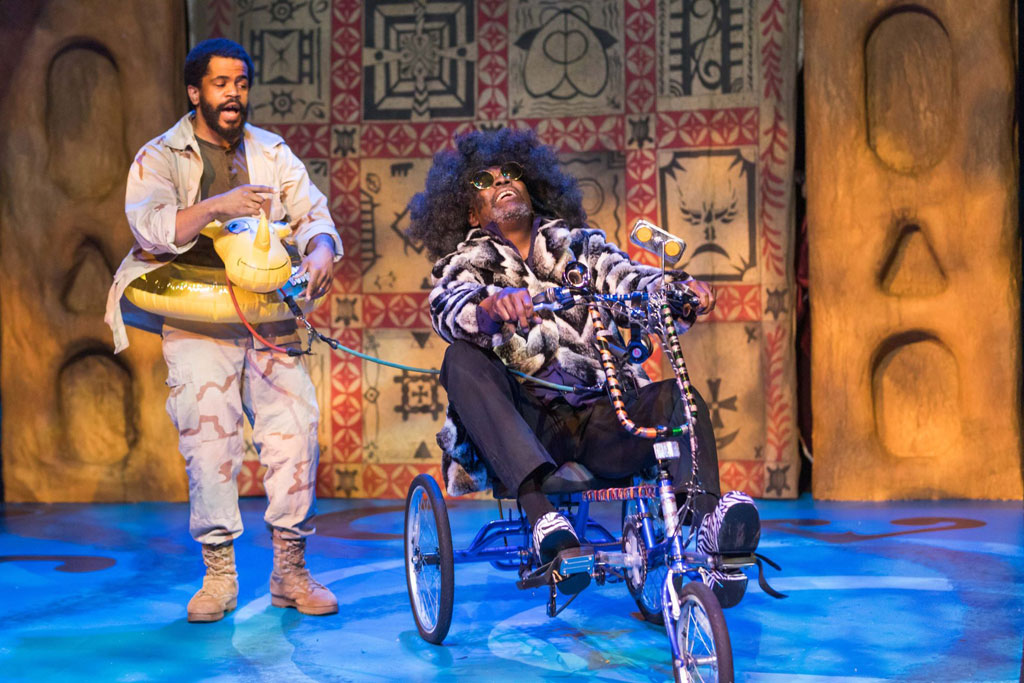


To call “Black Odyssey Boston” a retelling of the Greek myth of Ulysses “but with black people” would be a gross mischaracterization. Such a play, after all, would be politically weak and artistically disappointing. What good is seeing black bodies on stage if the stage is not affected by their blackness, if black folks are not allowed to tell their own narratives, rather than be stand-ins for a drama they do not know? And what good is a mere “retelling” of one of the oldest stories we have, a parroting of the past?
Luckily, “Black Odyssey Boston” is not concerned with such low-hanging fruit. Blackness is an interruption to the narrative, an opportunity for fundamental re-imagination. “The Odyssey,” at its core, is an exploration of movement, of diaspora, of home. The black American experience is itself defined by mass movement; the shipping of our ancestors across the Atlantic was its own form of ferrying, dropping an entire people in a place so far from home. At a surface level, then, “The Odyssey” seems to lend itself well to a black “retelling.” But Marcus Gardley and Benny Sato Ambush, the playwright and director, respectively, use the black diaspora as a setting-off point for a new journey, rather than a path trod before.


Like the original, the play tells the story of a soldier, Ulysses Lincoln, lost at sea, drifting from isle to hidden cove in a desperate attempt to reach his wife and son, Nella Pell and Malachi. And like the original, the journey proves fraught, a host of spirits, prophets, monsters and gods coming between Ulysses and his home. But besides this basic framework, “Black Odyssey Boston” shares little with its predecessor. Ulysses is not a triumphant war hero, but a bitter, guilt-ridden man, complicit in the war crimes of the U.S. military. Nella Pell and Malachi are beset not by an invading army, but by the forces of American anti-blackness, with Malachi’s soul spiraling deeper into despair with every police frisking and beating by white classmates. And the hauntings that bedevil Ulysses are complex manifestations of the black experience, from the sensual temptations of ’60s soul to the silent waters where the murder victims of white supremacy gather. The ocean that Ulysses must traverse are no longer the stormy waves of the Mediterranean, but the icy depths of the black diaspora, populated by dreams of some African homeland and nightmares of our dystopian American present.
Gardley’s script is a masterpiece, easily one of the most lyrically complex works in recent memory. It revels in the art of lack speech not by changing its content, but by sinking deeper into its nuances, its heart. Drawing directly from the street and the stoop, “Black Odyssey Boston” has words that sing, uttered by a talented cast with presence and full awareness of their majesty. But rather than retreat to a kind of haughtiness, the script and its speakers explode into a cool, funky, plaintive miasma of slang. It’s poetry; hard-slinging, pillowy, street poetry, buoyed by the nimble tongues of the actors who are admirably committed not to speaking the words, but to living them, luxuriating in them, wearing them like a mink coat.
Ambush’s direction is spectacularly liminal: He is obsessed with the spaces between destinations, between persons, between identities. The stage, designed brilliantly by Jon Savage, perhaps embodies this best. Divided into two points, one emerging as the home of the gods, the other the home of Nella Pell, the majority of Ulysses’ journey occurs in the wide stretch of stage between the two. Stellar lighting by Aja M. Jackson submerges the performances beneath murky sea blues and molten yellows, while characters switch from being portrayed by human actors to being small dolls carried aloft by the ensemble. Ambush coaxes performances that flow from comedic simplicity to a kind of poetic clarity. No moment is simple. The play is in constant motion, shifting like the ocean currents.
The cast, luckily, keeps its footing firm, rooting the play in absolute knockout performances. Elle Borders as Nella Pell, Hubens Cius as Malachi, and Brandon G. Green as Ulysses himself are the beating heart of the production. The force of their humanity rattles the stage, tearing at every audience member, forcing them to gobble up every second of their work. No line is wasted, no movement unfelt. While one wishes Borders had more to do than worry after the two men in her life (the play, in an unfortunate aside, inarguably fails the Bechdel test), her characterization is nonetheless staggeringly complicated, making more from what could have been pure caricature. Cius’ rage can be tasted from the furthest seats in the house, and his high-minded revolutionary philosophy plays not as precocious comedy but as a reminder of the deep-seated awareness black youth have of their own trauma. And Green does not set a single foot astray. Rarely does a stage actor manage to subsume themself so fully into the role that one forgets one is watching a performance. Green is one of those few.
Beyond the human cast, the gods of the myth have been transformed. In the place of Poseidon, Athena and Zeus stand Great Grand Paw Sidin, Great Aunt Tee and Great Grand Daddy Deus. Regie Gibson, Carolyn Saxon and Johnny Lee Davenport, respectively, find heavenly power, paradoxically, by leaning into the humanity of their characters. Great Grand Daddy Deus is a true father figure, distant in his grandiosity but grounded by a heartfelt love. Davenport commands instant respect, while Gibson in particular is a wonder, his chameleonic powers of immersion tested frequently, always to great success. His Paw Sidin is deliciously complicated, a swirling maelstrom of laziness, righteous anger, snide cruelty and, collecting it all, a kind of profound heartache about the state of black diasporic existence. Saxon emerges most fully when she descends from the mount of the gods and disguises herself as Ulysses’ human aunt, perfectly capturing the kind of deep love one always counts on from an auntie. All three performances find the spot between humanity and divinity. For the play, godhood becomes a way of understanding our ancestors, those from the land before that we lost in the wake of the Middle Passage. Thus, the divine are human, like us, but lost in a fog of communal memory, becoming godlike in their distance. Saxon, Davenport and Gibson capture this perfectly. The final trio, a collection of ancestors who shift roles – portrayed by Journey King, Kai Thomani Tshikosi and a particularly vivacious Ramona Lisa Alexander – are equally attuned to the dreamlike knottiness required of them and step up to the plate with admirable ease.
Populated by such lovingly crafted characters, guided by such loving hands, it is no wonder that “Black Odyssey Boston” is a complete success. Forcing the audience to traverse through its back canals and hidden coves, to explore the cavernous depths just under its surface, Front Porch Collective’s production is near perfection. If this is the future of black theater, there is an indubitably grand horizon before us.
A version of this story appeared originally on TheaterMirror.net.



